The Community Energy Challenge
Learn about other climate showcase communities.
Bellingham, Washington
Federal Funding: $349,384
Project Timeline: February 2010 – December 2012
- Project Summary
- Community Characteristics
- Results
- Lessons Learned
- Sustainability/ Replication
- Project Websites
- Photos
To promote energy conservation and lower greenhouse gas (GHG) emissions, the City of Bellingham developed a comprehensive energy efficiency outreach project. The City worked in partnership with the non-profit Sustainable Connections, the non-profit RE Sources for Sustainable Communities, and the utility Puget Sound Energy. The project, originally called the Whatcom Energy Challenge and later renamed the Community Energy Challenge (CEC), developed an education and outreach campaign and distributed publicity materials throughout the community, which included banners, mailings, and a website. The Challenge also held community events and hosted energy efficiency presentations at the neighborhood level. In addition, the Challenge selected 125 workplaces in which to promote conservation strategies to employees. Furthermore, Puget Sound Energy mailed home energy reports to half of the county's single-family households, providing information on their relative energy use. The CEC also implemented a Cool Schools Challenge (CSC) to train teachers, engage students, and provide take-home materials on energy efficiency in up to 58 schools.
The Bellingham CEC, completed in December 2012, spread the word about energy retrofits to homeowners and businesses by exhibiting materials at community events, tracking annual energy savings and GHG reductions on “save-o-meter” banners, and using door hangers, window clingers, yard signs, and referral postcards. During the effort, the CEC distributed information to CEC participants and Bellingham area residents on available energy efficiency incentives and, in a broader community outreach effort, ran advertisements in local newspapers. Additionally, during the final quarter of the project the CEC Neighborhood Participation Toolkit remained available upon request.
Bellingham also continued implementing the CSC in partnership with RE Sources, a non-profit environmental education organization. Eighteen schools implemented the CSC, in which staff used climate and energy efficiency presentations to educate students and distribute energy efficiency pledges to families. Additionally, RE Sources education staff trained 40 high school students for the CSC. RE Sources held a CSC Student Summit in December 2012 during which 45 local high school students and six teachers exchanged information about their current energy efficiency projects, as well as ideas for new projects.
The project resulted in energy savings, GHG emissions reductions, improved air quality, and extensive cost savings for local businesses and residents. In addition, the project was designed to be easily replicable for use in other communities.
Population 76,000
Area 32 square miles
Government Type: City
Community Type: Mid-sized urban
Median household income: $38,500
|
Final Results |
Projected Cumulative Results |
|
|---|---|---|
|
Annual GHG Reductions |
6,837 mt CO2e |
7,200 mt CO2e |
|
Annual Electricity Savings |
13,791 MWh |
12,300 MWh |
|
Annual Natural Gas Savings |
530,231 Therms |
338,000 Therms |
|
Annual Cost Savings |
$1,856,000 |
$1,330,000 |
|
Homes Retrofitted |
655 |
1000 |
|
Participating Businesses |
228 |
100 |
- Designing a program that allows for easy replication will increase its effectiveness
- Engaging students, who are likely to be enthusiastic and energetic, is a great way to engage the community
- The CSC Student Summit, during which 45 local high school students and six teachers exchanged information about their current energy efficiency projects, as well as ideas for new projects, provided a great pathway for continuing behaviors after the end of the program.
- Securing funds from other sources, after showing well-defined results from the CSC-funded project, can ensure continuation of the activities.
Community Energy Challenge website Exit
Community Energy Challenge Facebook page Exit
Community Energy Challenge Twitter page Exit
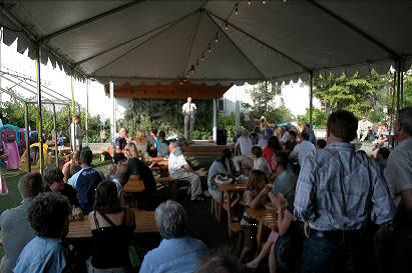 A brief presentation about the impacts of the Community Energy Challenge at the CEC’s Second Birthday Party
A brief presentation about the impacts of the Community Energy Challenge at the CEC’s Second Birthday Party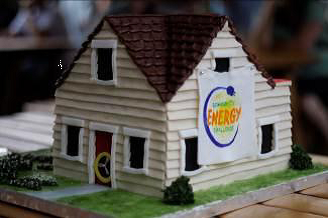 A birthday cake for the Community Energy Challenge in the shape of a house featuring a blower door and solar panels, made by a local business participating in the program.
A birthday cake for the Community Energy Challenge in the shape of a house featuring a blower door and solar panels, made by a local business participating in the program.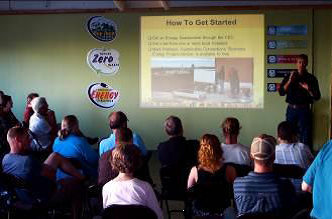 Presentation at the Solar Power Happy Hour. After the presentation, there was time for those interested in installing solar to network with the local companies that can help them do it.
Presentation at the Solar Power Happy Hour. After the presentation, there was time for those interested in installing solar to network with the local companies that can help them do it. The Community Energy Champion appearing at the Sustainable Connections All Members Meeting
The Community Energy Champion appearing at the Sustainable Connections All Members Meeting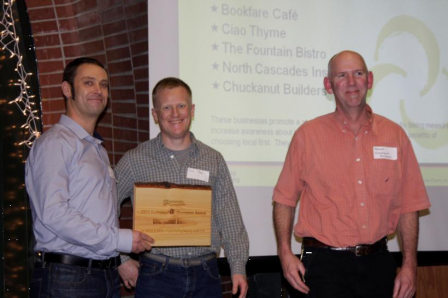 Two Community Energy Challenge Participants were given awards at the Sustainable Connections All Members Meeting. Chuckanut Builders (owners pictured here) is one of 7 participating General Contractors and was given an award for leadership in thinking local first. The North Fork Brewery, a commercial participant, was given an award for environmental leadership.
Two Community Energy Challenge Participants were given awards at the Sustainable Connections All Members Meeting. Chuckanut Builders (owners pictured here) is one of 7 participating General Contractors and was given an award for leadership in thinking local first. The North Fork Brewery, a commercial participant, was given an award for environmental leadership.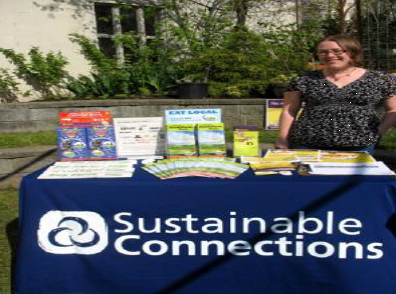 An Energy Program Assistant tabling at an Earth Day Celebration
An Energy Program Assistant tabling at an Earth Day Celebration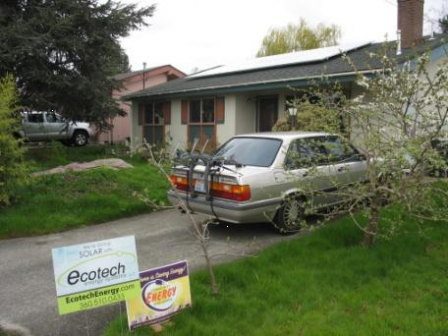 Community Energy Challenge Yard Sign and contractor sign at a Participating House
Community Energy Challenge Yard Sign and contractor sign at a Participating House Logo for Bellingham’s Community Energy Challenge
Logo for Bellingham’s Community Energy Challenge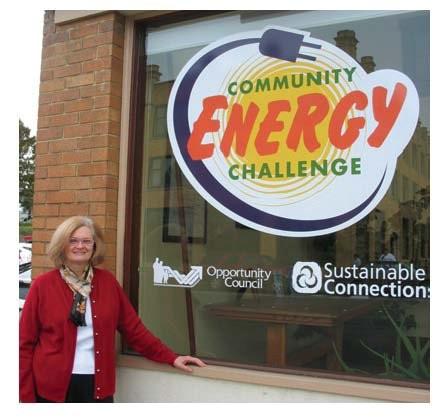 Caption: Community Energy Challenge Headquarters
Caption: Community Energy Challenge HeadquartersAt CEC Headquarters, residents can get tips and technical assistance.
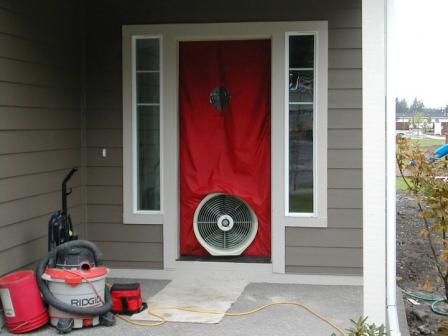 Home Energy Assessment
Home Energy AssessmentA blower door allows the analyst to determine air leakage from the home
 Find out how the Community Energy Challenge is helping Whatcom County homes and businesses save energy and money. Exit
Find out how the Community Energy Challenge is helping Whatcom County homes and businesses save energy and money. Exit